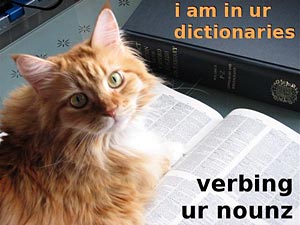There’s no doubt that a lot of my life revolves around this machine, before which I spend several hours a day. I’ve been riding this pony since 1992 (when I started building a Gopher presence, soon after I started work as a reference librarian at W&L), or maybe since 1989 when I started playing with HyperCard, or perhaps since 1984 when I bought my first microcomputer (a TI-Pro, still in the barn), or maybe 1979 when I started to play with SYMAP (making maps of demographic data from the Hungarian census of 1900), or maybe 1962 when I first started working with punch cards (as research assistant to Bob Textor in cross-cultural studies). At each of those junctures I had some idea of where I was heading, but the destinations kept changing as new possibilities emerged.
I seem to be in another spate of thinking about the ways the Web is/has been evolving, in the proximal contexts of Licklider‘s Libraries of the Future [1965] (which I’m reading at Gardner’s instigation) and the impending visit of friends with three home-schooled kids (for whom my question is: where does The Computer fit in what they’re doing?)… and reflecting on the many ways in which my life has been tangled up with computers. For at least 45 years I’ve seen them as essential tools for things I needed to do, though generally my imagination has outrun my technical capabilities, and I’ve relied upon the multiple kindnesses of others to assist with practicalities and realize my imaginings. There’s a looooong history of books and articles and Web resources that I’ve been influenced by, and an equally convoluted history of apps I’ve experimented with as I’ve worked at making sense of the potentials. Wish I could reconstruct all the steps…
I started library school in January 1991 with the question What will microcomputers do to libraries? but I certainly didn’t foresee that the most profound effect would be to distribute the end-user’s experience in most information transactions –to make the physical library mostly irrelevant to seeking answers, to enmesh the user in networks composed of nodes that might be on different continents, to make multimedia an everyday experience, and to proffer tools that make the user an active contributor to the construction of distributed knowledge. Two of today’s cases in point:
Harper’s release of 150+ years of full text archive exposes a glorious trove, and the possibility of gathering up David Halberstam’s contributions to the magazine adds a great deal to a resource like Christopher Lydon’s program recorded two days after Halberstam’s death
and
I discover that others who are reading Eco’s Mysterious Flame of Queen Loana have established a Wiki-based annotation project for the book.
At the moment I’m eagerly awaiting the imminent arrival of Dave Weinberger’s Everything is Miscellaneous: The Power of the New Digital Disorder (publishing tomorrow), listening to Weinberger’s Radio Open Source appearance, keeping an eye on Weinberger’s blog around the book, and still savoring a two-hour podcast of Weinberger’s Social Media Cluster talk of last week.
